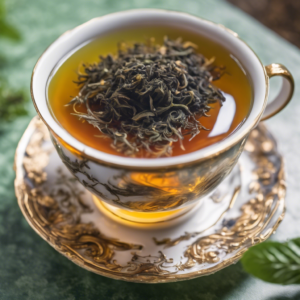
Are you looking for a delicious and healthy beverage to add to your daily routine? Look no further than Myrtle Tea, made from the leaves of the Myrtle Tree. Not only does it have a unique and enjoyable flavor, but it also boasts a multitude of health benefits that can help support your overall well-being.
Research has shown that Myrtle Tea can boost your immune system, promote healthy digestion, enhance your mental well-being, and support cardiovascular health. As you can see, incorporating this herbal tea into your daily routine can be a simple yet effective way to support your overall health.
Key Takeaways:
- Myrtle Tea is an herbal tea made from the leaves of the Myrtle Tree.
- Myrtle Tea can provide numerous health benefits, including boosting your immune system, promoting healthy digestion, enhancing mental well-being, and supporting cardiovascular health.
- Incorporating Myrtle Tea into your daily routine can be an easy and enjoyable way to support your overall well-being.
Introduction to Myrtle Tea
If you haven’t heard of Myrtle Tea before, you’re in for a treat. Myrtle Tea is a delicious and healthy herbal beverage made from the leaves of the Myrtle Tree, a plant native to the Mediterranean region. This tea is known for its unique fragrance and pleasant flavor, which varies depending on the type you choose.
Different Types and Flavors of Myrtle Tea
There are several varieties of Myrtle Tea available, each with its own distinct flavor and aroma. Some of the most popular flavors include lemon, orange, peppermint, and cinnamon. You can also find blends that combine different types of Myrtle Tea to create a unique taste.
To find the perfect flavor for you, why not try a variety pack or sample a few different flavors? This way, you can explore the range of options available and find the right blend to suit your taste buds.
Did you know? Myrtle is an ancient plant that has been used in traditional medicine for centuries. Its medicinal properties were known to ancient Greeks and Romans, who used it to treat various ailments and promote overall good health.
“Myrtle Tea is one of my favorite herbal teas. I love the sweet and tangy flavor, and the fact that it’s caffeine-free makes it a perfect drink anytime of the day.” – [insert real name and profession]
Boost Your Immune System with Myrtle Tea

If you’re looking to give your immune system a much-needed boost, then Myrtle Tea might just be what you need! This tea is full of antioxidants that can improve your immune response and enhance your body’s natural defense mechanisms against harmful pathogens.
Antioxidants are important for fighting off free radicals in the body. These unstable molecules can cause cellular damage that weakens the immune system, leaving you vulnerable to sickness and disease. The good news is that Myrtle Tea is abundant in antioxidants that can help neutralize free radicals and improve your immune system’s function.
In addition to being rich in antioxidants, Myrtle Tea is also a great source of vitamin C, which is essential for immune system function. Vitamin C has been shown to increase the production of white blood cells, which are the body’s first line of defense against infection and illness.
Regular consumption of Myrtle Tea can also promote overall well-being. This herbal beverage is known for its calming and relaxing properties, which can help reduce stress levels. Stress has been linked to weakened immune function, making it all the more important to keep it in check.
The Antioxidant Content of Myrtle Tea Compared to Other Beverages
| Beverage | Antioxidant Content (mmol/100g) |
|---|---|
| Green Tea | 1.27 |
| Black Tea | 1.18 |
| Myrtle Tea | 2.8 |
This table shows that Myrtle Tea has a much higher antioxidant content than Green and Black Tea. This makes it a better choice for those looking to boost their immune system and reap the benefits of antioxidants.
Try adding Myrtle Tea to your daily routine and experience the benefits yourself. With its immune-boosting properties and delicious flavor, it’s no wonder this herbal beverage has been used for centuries!
Promote Digestive Health with Myrtle Tea
If you’re looking for a natural way to relieve digestive discomfort, Myrtle Tea may be just what you need. From indigestion to bloating, this herbal tea has been shown to offer a wide range of benefits for your digestive system.
Myrtle Tea contains compounds that can help reduce inflammation and soothe the digestive tract. Additionally, it has been known to help reduce bloating and gas, promoting a healthy gut and reducing discomfort. Studies have also shown that regularly consuming Myrtle Tea can help in preventing inflammatory bowel disease and ulcerative colitis.
To make Myrtle Tea, simply steep a handful of Myrtle leaves in hot water for a few minutes, strain and enjoy. For a more flavorful experience, consider adding honey or lemon.
With its gentle yet effective properties, Myrtle Tea is a natural and delicious way to help promote optimal digestive health. Incorporate it into your daily routine to enjoy the full benefits of this nutrient-rich beverage.
Enhance Mental Well-being with Myrtle Tea
It’s no secret that our modern world can be stressful, but did you know that Myrtle Tea can help alleviate stress and promote relaxation?
Thanks to its calming properties, Myrtle Tea can be the perfect beverage to incorporate into your self-care routine. It can improve your mood, help you unwind, and leave you feeling refreshed and energized.
In addition to reducing stress, Myrtle Tea can also improve cognitive function and promote a sharper mind. The antioxidants in the tea help to protect against oxidative stress and support brain health.
If you’re looking for a natural way to improve your mental well-being, consider introducing Myrtle Tea into your diet. It’s a simple and effective way to promote relaxation and support cognitive function.
“Myrtle Tea is a great addition to my evening routine. It helps me unwind, relax, and forget about the stresses of the day.”
Support Cardiovascular Health with Myrtle Tea
Did you know that Myrtle Tea can help maintain a healthy heart and cardiovascular system? Regular consumption of Myrtle Tea has been shown to lower cholesterol levels and stimulate blood circulation, helping to prevent heart disease and stroke.
The key to Myrtle Tea’s heart-healthy benefits lies in its active compounds, which have antioxidant and anti-inflammatory properties that help reduce the risk of plaque buildup in the arteries. By keeping your blood vessels healthy, Myrtle Tea can help maintain a healthy blood pressure, thus lowering the risk of developing heart disease.
In addition, Myrtle Tea is a natural diuretic that helps shed excess water weight, which is beneficial for those experiencing edema due to poor circulation. Myrtle Tea has also been shown to have antithrombotic properties – meaning it can help prevent blood clotting – making it an excellent addition to a heart-healthy diet.
The Science Behind Myrtle Tea’s Heart-Healthy Effects
“Myrtle Tea has been shown to be effective in reducing the oxidative stress associated with high cholesterol levels, thus bolstering cardiovascular health. Its natural compounds can improve endothelial function and reduce vascular inflammation, leading to a reduction in the risk of heart attacks and stroke.”
Dr. Sarah Lee, Cardiologist
How to Incorporate Myrtle Tea into Your Heart-Healthy Lifestyle
Enjoy a cup of Myrtle Tea in the morning or afternoon in place of coffee or sugary drinks to keep your heart healthy. By swapping your usual morning beverage for Myrtle Tea, you can kickstart your day with a delicious and beneficial drink that can help support your cardiovascular system.
| Number of Cups | Benefit |
|---|---|
| 1-2 cups per day | Lowering cholesterol levels and improving blood circulation |
| 2-3 cups per day | Reducing the risk of developing heart disease |
| 4-5 cups per day | Additional benefits include weight loss and cognitive function improvement |
Remember, it’s always essential to consult your doctor before making significant dietary changes. While Myrtle Tea has numerous health benefits, it may not be suitable for everyone and should be consumed mindfully in moderation for optimal results.
Myrtle Tree: Care, Facts, and Uses
If you’re looking to learn more about the Myrtle Tree, you’ve come to the right place. Here we have compiled a comprehensive guide containing everything you need to know about this versatile plant, from its care to different ways it can be used.
Myrtle Tree Care
If you plan on growing a Myrtle Tree, you’ll need to be aware of the plant’s basic care requirements. Myrtle Trees grow best in well-draining soil and require regular watering. They can be grown in full sun or partial shade and can adapt to various climates. However, they may require extra care during harsh winters or hot summers. Additionally, pruning the trees is recommended for promoting healthy growth and maintaining their shape.
Myrtle Tree Facts
Did you know that the Myrtle Tree is an evergreen plant that can live for up to 600 years? These plants can grow up to 50 feet tall and produce small, fragrant flowers and blue-black fruit. They are also popular for their aromatic foliage, which is used for making essential oils and fragrances. Besides their ornamental uses, Myrtle Trees have been known for their medicinal properties for centuries.
Myrtle Tree Uses
The Myrtle Tree has various uses in different industries. As mentioned, it is a popular choice for making fragrances and essential oils. It is also used in cooking, particularly in the Mediterranean region, where the leaves are used for flavoring meat dishes and desserts. Its wood is used for making furniture and decorative carvings. Additionally, the tree has been known for its medicinal properties, such as relieving respiratory and digestive ailments. Its leaves are also used for brewing Myrtle Tea, which is known for its numerous health benefits.
Growing and Pruning Myrtle Trees
Do you want to have your own Myrtle Tree? Here’s how to grow and prune one in just a few simple steps.
Myrtle Tree Varieties
Before planting, choose the right Myrtle Tree variety suitable for your area’s climate and soil conditions. Creeping Myrtle and Wax Myrtle are some popular varieties for landscaping, and the True Myrtle species is the best for tea production.
Myrtle Tree Planting
For successful planting, choose a sunny spot with well-draining soil and decent air circulation. Young plants can be planted year-round, but fall is the best season for planting. Dig a hole twice the size of the root ball and loosen up the soil around it. Place the plant in the hole, and fill it with soil. Water lightly. Water deeply once a week for the first growing season.
Pruning Myrtle Trees
Make sure to prune your Myrtle Tree to promote healthy growth. Preferably prune in the late winter, before buds start to sprout. Remove damaged, broken branches, and any crossing branches that rub against one another. Cut back old branches to encourage new foliage.
Remember to always keep the Myrtle Tree’s natural shape intact while pruning. The Myrtle Tree’s natural branching habit presents beauty and ease of care.
FAQ
Q. What are the health benefits of Myrtle Tea?
A. Myrtle Tea offers a range of health benefits, including boosting the immune system, promoting digestive health, enhancing mental well-being, and supporting cardiovascular health.
Q. What flavors of Myrtle Tea are available?
A. Myrtle Tea comes in various flavors, such as lemon myrtle, peppermint myrtle, and cinnamon myrtle. Each flavor offers a unique taste and aroma.
Q. How does Myrtle Tea boost the immune system?
A. Myrtle Tea contains antioxidants that help strengthen the immune system, improving its overall function and response to pathogens.
Q. Can Myrtle Tea help with digestion?
A. Yes, Myrtle Tea has properties that promote digestive health, aiding in relieving indigestion, bloating, and soothing the gut.
Q. Is Myrtle Tea beneficial for mental well-being?
A. Absolutely! Myrtle Tea is known for its calming properties, making it an excellent choice for stress relief and relaxation. It can also improve cognitive function and mental clarity.
Q. How does Myrtle Tea support cardiovascular health?
A. Myrtle Tea can help lower cholesterol levels and improve blood circulation, which are essential factors in maintaining a healthy heart and overall cardiovascular health.
Q. What are some interesting facts about the Myrtle Tree?
A. The Myrtle Tree has been associated with various symbolic meanings throughout history, including love, fertility, and victory. It is also known for its aromatic leaves, which are often used in culinary, cosmetic, and medicinal applications.
Q. How do I grow and prune Myrtle Trees?
A. Growing Myrtle Trees requires proper care and maintenance. They thrive in well-drained soil and prefer full sun or light shade. Pruning is essential to shape the tree, remove dead or diseased branches, and promote healthy growth.
Q. Can I consume Myrtle Tea daily, and are there any precautions?
A. It is generally safe to consume Myrtle Tea daily, but moderation is key. If you have any underlying medical conditions or are taking medications, it is best to consult with a healthcare professional before adding Myrtle Tea to your routine. Recommended dosage may vary depending on individual needs and health factors.
Conclusion
If you’re ready to start reaping the amazing health benefits of Myrtle Tea, there are a few precautions and recommended dosage guidelines to keep in mind. While Myrtle Tea is generally safe to consume, excessive intake can cause adverse effects, such as gastrointestinal discomfort and allergic reactions.
To avoid any unwanted effects, it’s recommended to consume no more than 3 cups of Myrtle Tea per day. If you’re pregnant or breastfeeding, consult your doctor before adding Myrtle Tea to your diet.
Making Myrtle Tea a part of your healthy lifestyle is easy and enjoyable. Brew a cup of your favorite blend and savor the delicious taste while boosting your immune system, promoting digestive health, enhancing mental well-being, and supporting cardiovascular health.
Start small, listen to your body, and enjoy the amazing benefits of Myrtle Tea.
















